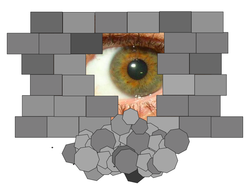| Sunday marks a minor Jewish fast day that you may never have heard about. The Fast of the Seventeenth of Tammuz is observed as the anniversary of the breach of the walls of Jerusalem by the Romans in the year 70 c.e. Some sources say that the same date also is the anniversary of the the day the Babylonians did the same thing in the year 586 b.c.e. Traditionally, Jews do not eat from the break of dawn to the end of dusk on this day to mourn the destruction of the Temple. |
Conservative Judaism, too, does not accept the idea that modern Jews should yearn for the rebuilding of the Temple. Instead, Conservative Jews observe the Fast of Tammuz, if at all, as a nostalgic remembrance of a bygone era of Judaism—one to which they do not wish to return.
I largely agree with these outlooks. I have no desire for Judaism to restore animal sacrifices or to rebuild the ancient Temple. Yet, I think there is deeper meaning in the Fast of Tammuz for us to rediscover and consider. Mourning on this day is not just about remembering Jewish history; it is also a practice of deepening Jewish spirituality.
According to a rabbinic legend, the walls of Jerusalem were broken on the seventeenth of Tammuz because it was the date on which Moses had smashed the tablets of the Ten Commandments in response to the sin of the Golden Calf. The Fast of Tammuz is a date for contemplating how our failures to live up to our highest ideals cause a rupture—a breach, if you will—in our relationship with God. The Fast of Tammuz reminds us of how broken we are individually in a world of brokenness.
The traditional haftarah reading for the afternoon of the Fast of Tammuz (also read on other fast days) is a passage from the prophet Isaiah that says, "Let the wicked give up their ways and the sinful turn away from their plans. Let them turn back to Adonai and God will pardon them" (Isaiah 55:7). At the same time that we acknowledge our broken state, we also declare the possibility of repair.
The tablets have been broken, but not the covenant that they represent. In fact, the very fact of our brokenness may be the thing that creates an opening in the wall for us to reach higher. No heart can feel so well as a heart that has been broken.
I will not be fasting on Sunday, but I will be thinking about those tablets—the ones that Moses shattered, and also the ones within my soul. The Fast of Tammuz is an opportunity to peer inside of ourselves, to break through the walls that separate us from our highest aspirations, and to remember to let the light shine from our broken hearts.
Other Posts on This Topic:
Devarim: How?
Ki Tisa: Moses, Anger and Parenting


 RSS Feed
RSS Feed
